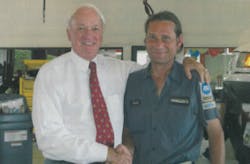Common traits of Tire Dealer of the Year nominees
I have been one of the judges for all but the first Modern Tire Dealer Tire Dealer of the Year award. Having reviewed many nominations over the last 15 years, I discovered a series of similar traits that help define our most successful tire dealers.
My information includes traits displayed by many dealers who were very strong finalists, yet did not win the coveted award. The reviews prove that for each annual winner, many other outstanding dealers deserve recognition. They run their businesses using the same winning traits.
Experience. Almost without exception, nominees have many years of experience in the tire business. Many grew up changing tires and learning the business in dad’s tire store. Others entered the industry by working for a tire manufacturer, later acquiring a tire store and building a successful business.
Growth. Dealer of the Year nominees create growth, and most open additional stores. More than three-quarters of nominees operate more than one store. Those who have one location build exceedingly high single-store sales volume and virtually monopolize their market area.
Industry involvement. More than 90% of MTD nominees evidence personal knowledge and involvement in the tire industry. Most are members of the Tire Industry Association (TIA) and also belong to their local tire dealer’s associations. Many have held leadership positions either nationally or locally, or both.
Nominees read industry publications and are frequent participants in various supplier councils, staying current on industry trends. Dealers who operate retread plants also support the Tire Retread & Repair Information Bureau, both personally and financially. Dealers also participate in key customer activities, such as local trucking and contractor associations.
Top dealers talk directly with customers and learn first-hand what buyers want and need. Without question, the nominees have in-depth, personal knowledge of the tire business and they stay up-to-date.
Community involvement. Fully 85% of recent nominees personally participate in community projects. They find the time to lend their management talents to local charities, sports teams, church work and special events. Dealer of the Year nominees also find time to serve on boards and create unique ways to help improve their communities. And they encourage their associates to volunteer in their own areas. In addition, personal involvement benefits dealerships by raising customer awareness in very positive ways.
Ninety percent of the tire dealers nominated contribute money to local events and organizations. Dealers support charities, churches and a few missionaries. Several dealers also have funds set aside to aid their employees if disaster strikes. Forty-five percent of recent nominees include sponsorships in their involvement plans. They sponsor sports teams, car races, picnics, and other community special events.
I sense a strong need for “giving back” among top tire dealers.
Education. More than 80% of the nominees report that they provide intensive training for their staff. Those involved in automotive service value ASE certification, and many heavily utilize TIA’s educational materials, along with supplier training and certifications, to ensure that their people remain competent. In particular, education about tire pressure monitoring systems is a priority right now.
Large dealers often have in-house training facilities and full-time training directors. Smaller dealers rely on frequent staff meetings and materials published by TIA and suppliers. Without question, today’s top tire dealers place heavy emphasis on building and retaining a highly competent staff.
Pay and benefits. Successful dealers appear to consider fair pay and competitive benefits to be a given in today’s difficult labor market. After providing fair compensation, many dealers provide health plans and other optional benefits, partially paid by the dealership. Some offer 401(k) savings plans with modest dollar matching of employee contributions.
Dealers also mention bonus plans and commissions based upon gross profit as ways they reward those who contribute to their success. Some dealers send employees to industry shows and reward star performers with supplier trips.
Business philosophy. More than half of the nominees mention that their business philosophy centers on the “Golden Rule” and the feeling of “family.” Many treat all of their employees like family, coming to their aid during emergencies. Employee turnover is rare. Dealers treat people with respect and longtime employment is common.
The Golden Rule also applies to customers. One dealer wants his customers treated as if they are favorite relatives. Dealers realize that they must provide service that exceeds the customer’s expectations. I have read that phrase in more than one dealer’s mission statement.
Marketing products and services. About three-quarters of the nominees retail passenger and light truck tires and automotive services to consumers. Retailers rely more heavily on in-store staff and indirect communication methods. The most often- mentioned method is direct mail, used by more than half of all nominees. Some dealers now use sophisticated “data mining” techniques applied to their sales records to highlight customer segments, and personalize and time their mailings.
Almost half of the dealers use a mix of newspaper advertising, cable television and radio spots. Yellow Page ads and Internet Web sites are also popular means of attracting business.
Half of the dealers operate commercial tire centers, providing light truck, medium truck, OTR, and specialty tires to truck fleets, contractors, farms and manufacturers. Most commercial dealers operate service trucks and provide on-site tire service, pick-up and delivery.
Commercial dealers tend to employ field sales representatives to call directly on customers.
Commercial tire centers also use direct mail and sponsorships to get their names in front of prospects.
At least two-thirds of the commercial dealers also retread truck tires and specialty tires. Nominees report that retreading continues to offer commercial users an important means of gaining maximum economy from expensive new tire purchases. Today’s high quality retreads reduce overall cost per mile or hour. Low rolling resistance tread compounds and special treads also help control fuel consumption.
Some commercial tire dealers even provide new and reconditioned wheels and other mechanical services. About one-quarter of the dealer nominees have both retail and commercial operations.
A sign of the times is the tendency for independents to be multi-brand dealers. About 60% of the nominees report that they carry an array of tire brands to meet their customers’ needs for both quality and price. Chances are that most independent dealers carry two, three or more tire brands.
There are many qualified dealers out there. Perhaps you know or work with a tire dealer who exhibits the sort of traits I have outlined. If so, place his name and company in nomination for MTD’s 2009 Tire Dealer of the Year Award. Look for nomination forms in future issues of Modern Tire Dealer, or visit www.moderntiredealer.com.
Dick Morgan is a certified management consultant (CMC). He founded Morgan Marketing Solutions Inc. in 1989. He has more than 34 years of tire and retread industry experience, working with manufacturers, retreaders and tire dealers. He is the author of Marketing Facets: the Market-Focused Guide to Company Analysis, a resource for those involved in determining the current health of a company and gauging its future prospects. You can contact Morgan at (972) 931-7993 or [email protected].
About the Author

Bob Ulrich
Bob Ulrich was named Modern Tire Dealer editor in August 2000 and retired in January 2020. He joined the magazine in 1985 as assistant editor, and had been responsible for gathering statistical information for MTD's "Facts Issue" since 1993. He won numerous awards for editorial and feature writing, including five gold medals from the International Automotive Media Association. Bob earned a B.A. in English literature from Ohio Northern University and has a law degree from the University of Akron.
